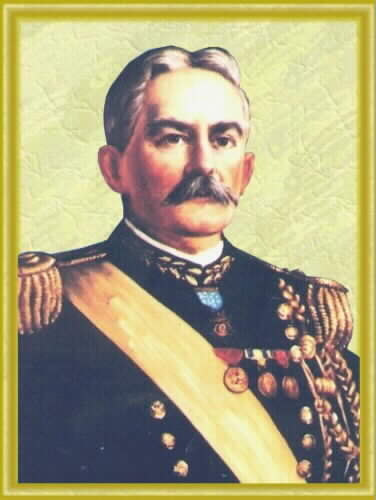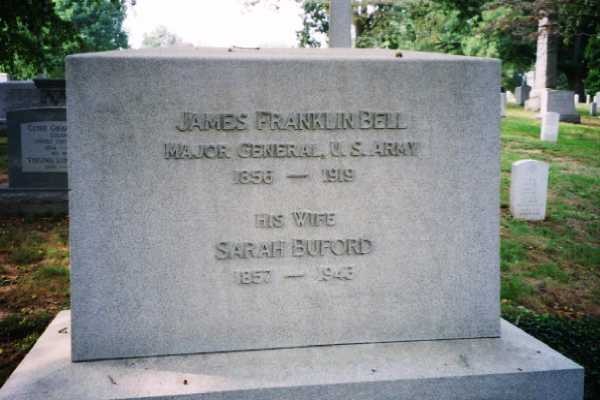“I would rather die at the front than spend the rest of my life explaining why I was not there.” No other words could more aptly describe the avowed professionalism and selfless devotion to duty of General James Franklin Bell.
He is recognized as one of the most brilliant and courageous soldiers of his time. He is especially recognized as an Indian fighter and as a regimental commander in the Philippines, where he earned the Medal of Honor for gallantry during the war with Spain. General Bell is known as “The Father of the Leavenworth Schools” as a result of his forceful and progressive leadership while serving as Commandant of the Infantry, Cavalry, and Staff Schools then located at Fort Leavenworth. The peak of his military career came when he was appointed Chief of the Army General Staff by President Theodore Roosevelt.
Born near Shelbyville, Kentucky, on January 9, 1856, he graduated from West Point in 1878 and was commissioned in the Cavalry. His first post was with the 7th Cavalry at Fort Abraham Lincoln, Dakota Territory. His frontier duty was broken by assignment as an instructor of Military Science and Tactics at Southern Illinois Normal University, 1886-1889.
He was absent on leave from the regiment at the time of the Wounded Knee Massacre in December 1890. He was promoted to First Lieutenant in the latter year and took part in a campaign around Pine Ridge, South Dakota, in 1891 and later that year joined the staff of the Cavalry and Light Artillery School, Fort Riley, Kansas.
He was detailed to the staff of General James W. Forsyth in 1894 in the Department of California; to the Department of the Columbia as Judge Advocate in 1898. A few months later he was appointed Major of United States Volunteers and ordered to the Philippines in connection with the Insurrection there, and he served with General Wesley Merritt's VIII Corps.
He was promoted to regular Captain in March 1899 and served with great distinction, part of the time as Chief of Scouts under General Arthur MacArthur. In July he was appointed Colonel of the 36th Volunteer Infantry and on September 9, 1899 earned the Medal of Honor as the result of charge of a Filipino patrol. In December 1899, he was appointed Brigadier General of Volunteers, and subsequently commanded various districts on Luzon and served for a time as Provost Marshal for Manila.
He was promoted to Brigadier General, United States Army, in February 1901 and in July 1903 returned to the United States to take command of the General Service and Staff College at Fort Leavenworth, Kansas.
From April 1906 to April 1910 he served as Chief of Staff of the United States Army, with rank of Major General from June 1907. From 1911 to 1914 he commanded the Philippine Department and his subsequent commands were: 2nd Division at Texas City, Texas, 1914-15; the Western Department, 1915-17; the last command being interrupted by a training assignment with the newly formed 77th Division in 1917 and by an observation mission to France in 1917-18 during World War I.
He died in New York City on January 8, 1919 and was buried in Section 3 of Arlington National Cemetery. His wife, Sarah Buford Bell (1857-1943) is buried with him.
MRS. JAMES F. BELL
Widow of Army Chief of Staff, 1906-10, Diea in Capital at 86
WASHINGTON, December 22, 1943 – Mrs. James Franklin Bell, widow of Major General Bell, died at her home here today at the ageof 86. Her husband, who died in 1919, was Chief of Staff of the Army from 1906 to 1910, in the Theodore Roosevelt Admimistration. He commanded the Seventy-seventh Division (New York) during its training period in the First World War but his health made it impossible for him to accompany it to France.
Mrs. Bell shared a long career with her husband, in which he achieved unusual distinction. They were married in 1881, less than three years after he was graduated from West Point. In 1898 she saw him go to the Philippines in command of a volunteer regiment – a lieutenant in the regular Army, but a temporary Colonel. With a very few years he achieved general rank and only eight years later stepped into the position now held by General George C. Marshall.
Mrs. Bell had lived in quiet retirement in recent years, sharing a home with her brother, Thomas J. Buford, who survives, as does a sister, Mrs. E. A. Garlington.
A funeral service will be held Friday in Arlington National Cemetery where Mrs. Bell will be buried beside her busband.
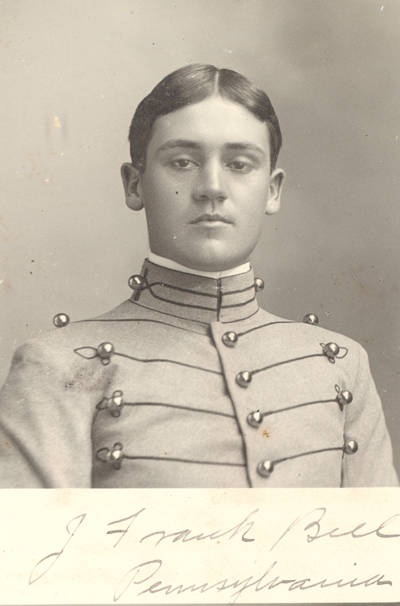
BELL, J. FRANKLIN
Rank and organization: Colonel, 36th Infantry, U.S. Volunteers. Place and date: Near Porac, Luzon, Philippine Islands, 9 September 1899. Entered service at: Shelbyville, Kentucky. Born: 9 January 1856, Shelbyville, Kentucky. Date of issue: 11 December 1899.
Citation: While in advance of his regiment charged 7 insurgents with his pistol and compelled the surrender of the captain and 2 privates under a close fire from the remaining insurgents concealed in a bamboo thicket.
HISTORY OF KENTUCKY AND KENTUCKIANS, E. Polk Johnson, three volumes, Lewis Publishing Co., New York & Chicago, 1912. Common version,
Vol. III, pp. 1258-59-60.
MAJOR GENERAL JAMES FRANKLIN BELL–Of the many notable Kentuckians who have been conspicuous in the naval and military service of their country, there is none, whether volunteer or regular, who has achieved higher distinction as a soldier than Major General James Franklin Bell, late Chief of Staff of the Untied States Army. His rise to eminence was not the result of fortuitous circumstances or of personal or official favoritism, but was the assured reward of thorough preparation, hard and faithful work, patient waiting, and proved capacity. His elevation of the chief command of the army of the United States caused no envious murmurings and no adverse comment, open or suppressed, because of the unanimously recognition, throughout all branches of the service, of his superior merit and of his absolute fitness. Moreover, his frank, open nature and sunny, warm-hearted, generous disposition have won and bound to him a host of friends, both in the army and out of it. To such friends and to this numerous kindred and “cousins” throughout Kentucky, his official title and trappings are of far less moment than his own loyal, lovable, big-hearted manhood, and with these, his own home people, he is even to this day simply but affectionately plain “Frank Bell.”
General Bell comes of a race of warriors. His great-great grandfather, Captain David Bell, of Augusta County, Virginia, served both in the French and Indian war and in the War of the Revolution. His son, John Bell, in all likelihood, also saw service in the Revolutionary army of Virginia, and many of their kindred in Augusta County and throughout the Valley of Virginia went forth to swell the patriot forces in the field.
William Bell, the immigrant ancestor, and father of Captain David Bell, mentioned above, was a member of the large Scotch-Irish colony settled in the North of Ireland. Here he was born about the year 1685. With many of his name and kindred, he emigrated to America about 1735, probably entering the Delaware Bay and river and landing first in Pennsylvania. He settled in Augusta county, Virginia, about eight miles northeast of the site of Staunton, in 1738-40, certainly prior to 1746. Was a staunch Presbyterian and founded the family locally known as “The Stone Church Bells,” by which name they have always been distinguished from other families of the same name in Augusta county. The Bell family was closely allied, by blood and marriage, to the Andersons, Allens, Craigs, Trimbles, Henderson, Millses and other prominent Augusta county families.
John Bell, son of Captain David Bell by his wife, Florence Henderson, and grandson of William, the progenitor of the family, was born in Augusta county, Virginia, about 1758; married in Botetourt county, Virginia, about 1788, Jane Mills, a daughter of John Mills, Sr., and sister of Captain John Mills, of the Revolutionary army. John Bell removed from Virginia to Fayette county, Kentucky, about 1790. By the will of his father, Capt. David Bell, a military survey of 2,000 acres, for services in the French and Indian war, located on Shannon's Run, a branch of Elkhorn Creek, in Fayette (originally Fincastle) county, was devised to him and his brother, James Bell. They secured this land almost in its entirety, and James Bell continued to reside on a portion of it until about the year 1840. John Bell farmed on an extensive scale and raised a large family of children. He died in March, 1835, at “Stoneleigh,” his handsome estate near Lexington, and his widow, Jane (Mills) Bell, also died there in 1836.
James Franklin Bell, son of John was born in Fayette county, Kentucky, September 13, 1803, and died near White Sulphur, in Scott county, Kentucky, November 13, 1866. He farmed successfully in Fayette, Franklin, Scott and Woodford counties, and, like his father before him, was long a Ruling Elder in the Presbyterian church. His wife, Mary Jane Wilson, was a native of Scott county, Kentucky, a daughter of Captain John Wilson, and granddaughter of Richard Wilson, of Pennsylvania, a near kinsman of Hon. James Wilson, the “Signer” and Supreme Court Justice.
John Wilson Bell, the eldest son of James Franklin Bell, became the father of General James Franklin Bell, the subject of this sketch. Born in Franklin county, Kentucky, on May 8, 1829, he died at Shelbyville, Kentucky, on January 3, 1904. He was twice married. His first wife, Sarah Margaret Allen, mother of General Bell, was a daughter of Dr. Joseph Fawcett Allen, by his wife, Sarah Anne Venable, both of Shelby county, Kentucky. Sarah (Venable) Allen was a granddaughter of Colonel John Cowam of Lincoln and Mercer county, Kentucky. Colonel Cowan was of Scotch-Irish descent and was a prominent leader among Kentucky pioneers. He came from Pennsylvania to Kentucky at a very early day, was a captain of militia in Lincoln county, Virginia, now Kentucky, during the Revolution and later held the rank of Colonel in the Kentucky militia. John Wilson Bell married, secondly, Jane Hardin Logan, a granddaughter of Mark Hardin and a great-granddaughter of Governor John Adair of Kentucky. Preserving the traditions of his family, John Wilson Bell, for many years before his death, was a Ruling Elder of the Presbyterian church at Shelbyville. His long and honorable career was devoted to the engrossing activities of farm and country life. Two of his brothers, Captain Joseph Nelson Bell and Captain David Brainard Bell, served during the Civil war, in the Confederate army, as also did their brother-in-law, Henry Simpson Halley. All three were ideal soldiers.
James Franklin Bell, the Major-General was born near Shelbyville, in Shelby county, Kentucky, on January 9, 1856. Only a meager summary of his arduous and eventful career can be given here. He received his preparatory education in the public schools of Shelbyville, and, in 1874, entered as a cadet the United States Military Academy at West Point, New York. From this historic institution he graduated with honor in 1878. Was at once commissioned Second Lieutenant and, later, as First Lieutenant of Cavalry. He served on the plains in the Seventh U.S. Cavalry, Custer's old command and a crack regiment, from 1878 to 1894. Captured a band of half-breed Cree Indians, near Fort Buford, South Dakota, in 1883. Served in the Sioux Campaign, around Pine Ridge, South Dakota, in 1891. Was Adjutant of regiment and Secretary of Cavalry and Light Artillery School, 1891-1894, and Aide to General J. W. Forsyth, in California, Arizona, and the state of Washington, in 1895-1898. Served with marked distinction in the Spanish-American Campaign in the Philippine Islands and in the Philippine insurrection. Was promoted to Captain, U.S.A., in March 1899. On March 7, 1899, was wounded in action at San Juan del Monte, P.I. On July 5, 1899, was appointed Colonel of Volunteers, and organized the 36th Infantry, U.S. Volunteers, in the Philippine Islands during the same month. He continued in command of this regiment until December, 1899. In 1899 he was awarded a Congressional Medal of Honor for gallantry in action, near Porac, P.I. December 5, 1899, was appointed Brigadier General of Volunteers. Commanded the Fourth Brigade, Second Division, Eighth Army Corps, and 3rd District, Department of Northern Luzon, to July, 1900. Was Provost Marshal-General of the City of Manila, P.I., to February, 1901. Appointed Brigadier General, U.S.A., in February, 1901. Commanded 1st District, Department of Northern Luzon, to November, 1901, and the Third Brigade, Department of Southern Luzon, to December, 1902. Returned to the United States in 1903. Was Commandant of the Infantry and Cavalry School, Signal School and Staff College, to April, 1906. Became Major-General, U.S.A., on January 3, 1907. Received the degree of LL.D. from the State University of Kentucky,, at Lexington, on June 6, 1907. From April, 1906, to April, 1910, was Chief of Staff and, next to the President, the virtual head of the United States Army. In the spring of 1910, by his own request, he was relieved from this responsible and very exacting position by President Taft, and since December, 1910, he has been assigned to duty in the Philippines, over the military establishment of which he has supreme command.
On January 5, 1881, General Bell was married to Sarah Buford, daughter of Thomas Jefferson and Grace (Bowers) Buford, of Rock Island, Illinois. Their married life has been an ideally beautiful and happy one, and Mrs. Bell, who is a woman of exceptional intellectual and social attractions, has been to her husband at all times both an aid and an inspiration. Her sister, Ann Buford, is the wife of Brigadier General Ernest A. Garlington of the regular army. The Bufords, like the Bells, are a vigorous and valiant old Kentucky family of the best Virginia stock.
Besides the large infusion of Scotch-Irish blood which fills his veins, General Bell may also claim sturdy English lineage. This comes through the Venables, the Fawcetts, the Pollocks (or Polks), the Mortons and the Woodsons. Through the marriage of Abraham Venable to Martha Davis, a granddaughter or great-granddaughter of the Indian “Princess” Niketti (“She sweeps the dew from the flowers”) it is possible for General Bell to claim descent from Opechancanough, the celebrated Chief of the Powhatans and uncle of Pocahontas. The prominent and powerful Virginia families who trace their descent in part from Niketti are, most of them, as proud of the fact as are the numerous descendants of Pocahontas of the high-bred Indian strain which they owe to her. To the list of Scotch-Irish families found in general Bell's pedigree and already mentioned should be added the names of the Millers, McClellands, Hunters, Montgomerys, Gilchrists and Wilsons.
Certainly from the happy commingling of such sturdy and heroic ancestral strains, it is not strange that so perfect a specimen of physical manhood, so fine a soldier, and such a whole-hearted, genuine Kentucky gentleman, clothed invariable with the modesty, which one finds so becoming in an acknowledged master of the art of war, should have been produced. Kentucky has furnished to the nation no son of whom she has more reason to be justly proud.
Bell, James Franklin
Major , U.S. Army
Home: Shelbyville, Kentucky
Engineering Officer, U.S. Volunteers
Date of Action: August 10, 1898
General Orders No. No. 3, W.D., 1925
Citation:
The Distinguished Service Cross is presented to James Franklin Bell, Major , U.S. Army, for extraordinary heroism in action against Spanish forces at Manila, Philip pine Islands , August 10, 1898.
Major Bell, with utter disregard for his personal safety, conducted a bold and daring reconnaissance of the creek in front of Fort San Antonio de Abad held by Spanish forces, and ascertained not only that it was fordable, but the exact width of the ford at the beach, and swimming in the bay to a point from which he could examine the Spanish line from the rear, secured information which facilitated the planning of the successful attack of August 13, 1898, on Manila, Philip pine Islands.
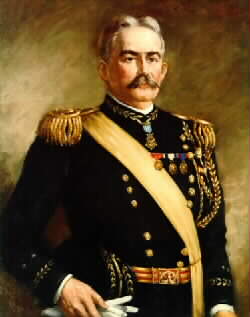
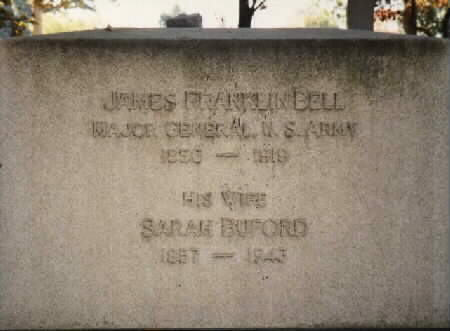
Michael Robert Patterson was born in Arlington and is the son of a former officer of the US Army. So it was no wonder that sooner or later his interests drew him to American history and especially to American military history. Many of his articles can be found on renowned portals like the New York Times, Washingtonpost or Wikipedia.
Reviewed by: Michael Howard

